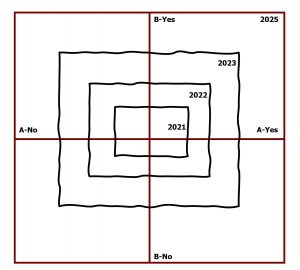“Why is planning so important?” I asked.
“Well, if we have a plan, we know what to do,” Susan replied.
“And, if we know what to do, then we will get what we want in terms of the outcome?” I pressed.
“Well, most of the time.”
I shook my head. “Rarely. Planning only works until its train wreck with reality. Most of the time, things turn out the way they turn out, regardless of the plan. So, why is planning so important?”
It was Susan’s turn to shake her head. So, I continued.
“Think about planning as the mental exercise of anticipation.”
Susan’s head shaking became a nod. “Anticipation sounds like what ifs. We don’t know the what ifs in the future, all we can do is guess. What if we guess wrong?”
“So, our planning has to include what if-yes and what if-no,” I said. “And, is there more than one variable in the future?”
“Always more than one variable,” Susan replied.
“And, if we take variable A-yes, variable A-no and variable B-yes, variable B-no, that gives us four quadrants to plan in.”
Susan jumped in. “And if we take short-term and long term slices.” Susan stopped.
“Planning is the mental preparation for making decisions down the road in the face of uncertainty,” she continued. “And the further into the future we plan, the more uncertainty there is. It is not the plan on the piece of paper that matters. It’s the mental fitness, exercised by planning, that makes the difference in the problems that must be solved and the decisions that must be made.”
______
For more information on scenario planning, visit Gideon Malherbe.

Tom,
your definition “Planning is the mental preparation for making decisions down the road in the face of uncertainty,” she continued. “And the further into the future we plan, the more uncertainty there is. It is not the plan on the piece of paper that matters. It’s the mental fitness, exercised by planning, that makes the difference in the problems that must be solved and the decisions that must be made.” is GREAT! However, flexible implementation is the key. It’s easy to be stuck in yesterday’s tactics because they worked… a flexible strategic purpose requires constant vigilance that the past successes may require new approaches for success in the future… Stay fast on your feet 🙂 DBK
Hi, Bill,That’s where I see the power of Gideon’s model, scenario planning. Often, we only think of one scenario with a small contingency. Scenario planning opens to a wider range of possibilities and action is governed by circumstances (data). -Tom